Semiotext(e)
Semiotext(e)
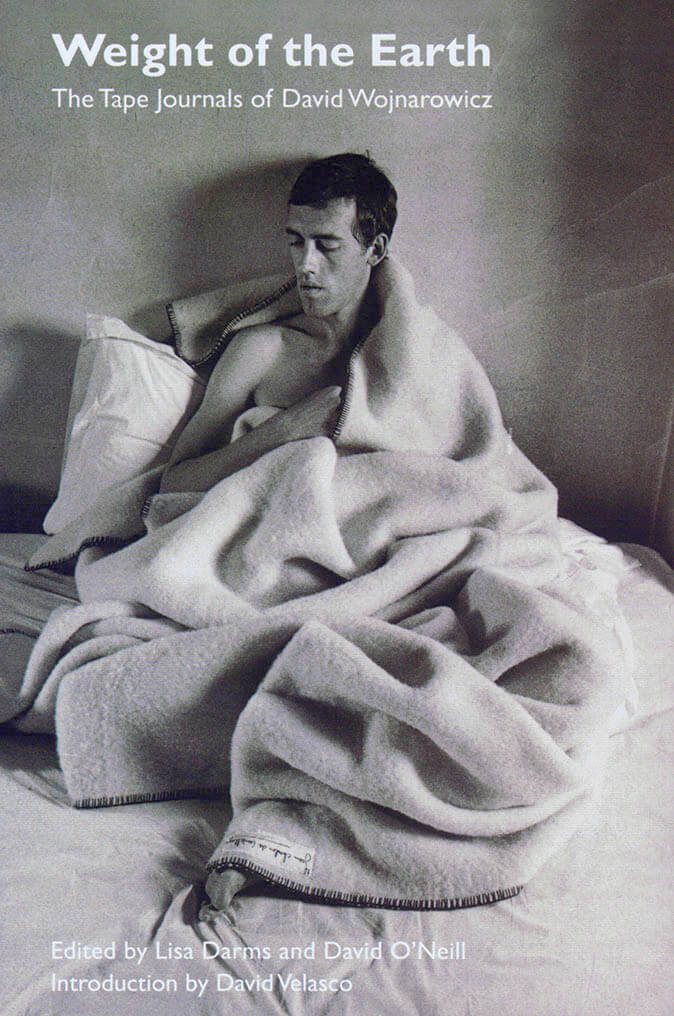
The Weight of the Earth
Audio journals that document Wojnarowicz's turbulent attempts to understand his anxieties and passions, and tracking his thoughts as they develop in real time.
"In these moments I hate language. I hate what words are like, I hate the idea of putting these preformed gestures on the tip of my tongue, or through my lips, or through the inside of my mouth, forming sounds to approximate something that's like a cyclone, or something that's like a flood, or something that's like a weather system that's out of control, that's dangerous, or alarming.... It just seems like sounds that have been uttered back and forth maybe now over centuries. And it always boils down to the same meaning within those sounds, unless you're more intense uttering them, or you precede them or accompany them with certain forms of violence."
—from The Weight of the Earth
Artist, writer, and activist David Wojnarowicz (1954-1992) was an important figure in the downtown New York art scene. His art was preoccupied with sex, death, violence, and the limitations of language. At the height of the AIDS epidemic, Wojnarowicz began keeping audio journals, returning to a practice he'd begun in his youth.The Weight of the Earth presents transcripts of these tapes, documenting Wojnarowicz's turbulent attempts to understand his anxieties and passions, and tracking his thoughts as they develop in real time.
In these taped diaries, Wojnarowicz talks about his frustrations with the art world, recounts his dreams, and describes his rage, fear, and confusion about his HIV diagnosis. Primarily spanning the years 1987 and 1989, recorded as Wojnarowicz took solitary road trips around the United States or ruminated in his New York loft, the audio journals are an intimate and affecting record of an artist facing death. By turns despairing, funny, exalted, and angry, this volume covers a period largely missing from Wojnarowicz's written journals, providing us with an essential new record of a singular American voice.

Fascination
Fascination brings together an early memoir, 'Bedrooms Have Windows' (1989) and a previously unpublished prose work, 'Bachelors Get Lonely', by the poet and novelist Kevin Killian, one of the founding members of the New Narrative movement. The two together depict the author's early years struggling to become a writer in the sexed-up, boozy, drug-ridden world of Long Island's North Shore in the 1970s. It concludes with Triangles in the Sand, a new, previously unpublished memoir of Killian's brief affair in the 1970s with the composer Arthur Russell. Fascination offers a moving and often funny view of the loneliness and desire that defined gay life of that era-a time in which Richard Nixon's resignation intersected with David Bowie's 'Diamond Dogs'-from one of the leading voices in experimental gay writing of the past thirty years. "Move along the velvet rope," Killian writes in 'Bedrooms Have Windows', "run your shaky fingers past the lacquered Keith Haring graffito: 'You did not live in our time! Be Sorry!'"
Kevin Killian's Fascination comes to us with delay, yet arrives, thankfully, as though preserved within the flaps of an unsent, sealed, and searing correspondence, consummate and irreverent, having wasted no time. With their uncompromising wit and harnessed consciousness, Killian's memoirs propose that the project of remembrance, though dotted with loss, is also one of relentless recall for relentless pleasure. Not all of Killian's memories are his, but through him they become yours; others are rewound and replayed. Killian's invitation, though we wouldn't dare to rebuff it: "Remember me!"
— Rachel Valinsky
Kevin Killian was a San Francisco-based poet, novelist, playwright, and art writer. Recent books include the poetry collections Tony Greene Era and Tweaky Village. He is the coauthor of Poet Be Like God: Jack Spicer and the San Francisco Renaissance. With Dodie Bellamy, he coedited Writers Who Love Too Much: New Narrative Writing, 1977-1997.
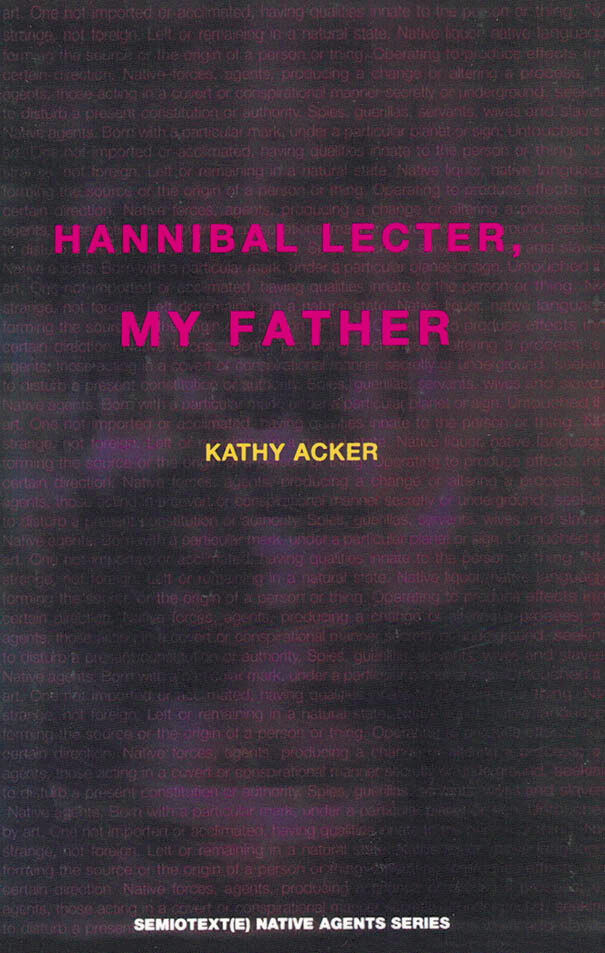
Hannibal Lecter, My Father
A collection of early and not-so-early work by the mistress of gut-level fiction-making.
You can say I write stories with sex and violence and therefore my writing isn't worth considering because it uses content much less lots of content. Well, I tell you this: 'Prickly race, who know nothing except how to eat out your hearts with envy, you don't eat cunt'...
Edited by Sylvere Lotringer and published in 1991, this handy, pocket-sized collection of some early and not-so-early work by the mistress of gut-level fiction-making, Hannibal Lecter, My Father gathers together Acker's raw, brilliant, emotional and cerebral texts from 1970s, including the self-published 'zines written under the nom-de-plume, The Black Tarantula.
This volume features, among others, the full text of Acker's opera, The Birth of the Poet, produced at Brooklyn Academy of Music in 1985, Algeria, 1979 and fragments of Politics, written at the age of 21. Also included is the longest and definitive interview Acker ever gave over two years: a chatty, intriguing and delightfully self-deprecating conversation with Semiotext(e) editor Sylvere Lotringer—which is trippy enough in itself as Lotringer, besides being a real person, has appeared as a character in Acker's fiction. And last, but not least, is the full transcript of the decision reached by West Germany's Federal Inspection Office for Publications Harmful to Minors in which Acker's work was judged to be not only youth-threatening but also dangerous to adults, and subsequently banned.
Acker is the sort of the writer that should be read first at 16, so that you can spend the rest of your life trying to figure her out; she confuses, infuriates, perplexes and then all of a sudden the writing seems to be in your bloodstream, like some kind of benign virus. She's definitely not for the easily offended—but then, there are worse things in life than being offended. Such as the things that Acker writes about...
Kathy Acker was a novelist, essayist and performance artist whose books include Blood and Guts in High School, The Childlike Life of the Black Tarantula, Empire of the Senseless, In Memoriam to Identity, Don Quixote, My Mother: Demonology, and her last novel, Pussy King of the Pirates. Born and raised on New York's Upper East Side, she died of breast cancer in Tijuana, Mexico, in 1997.
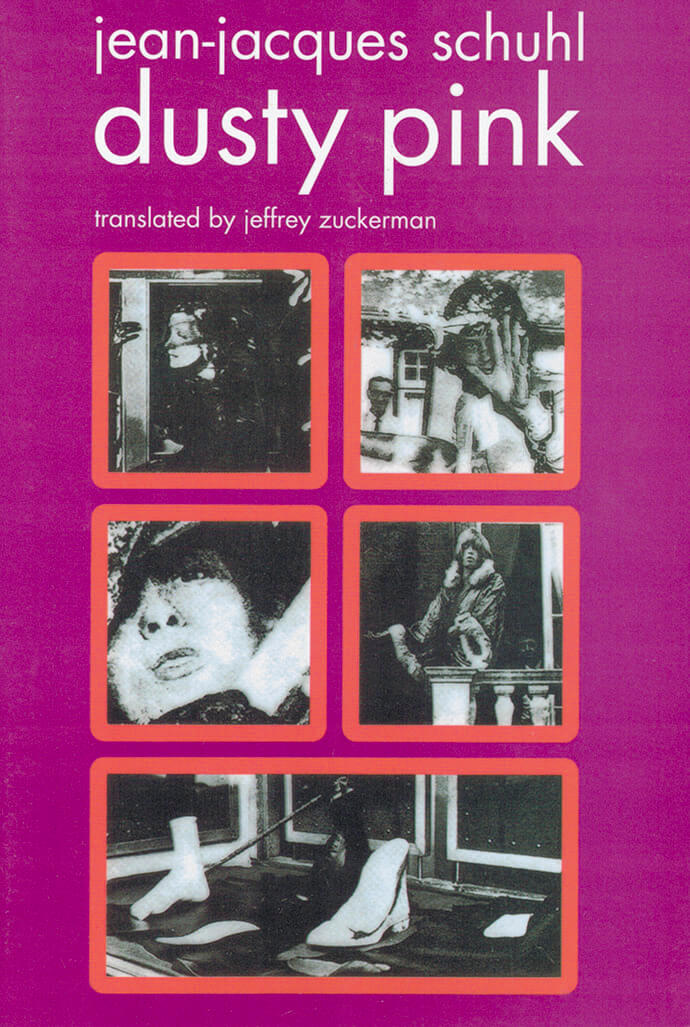
Dusty Pink
A cult classic in France, the first translation of a novel that captures a subjective stroll through an underground, glamorous Paris.
'finally there are the rolling stones who call for all these at the same time among them and around them: the policeman, the cross-dresser, the dancer, Frankenstein, the dandy, the robot'
—from Dusty Pink
Written with the hope of achieving a "dreary distant banality," Jean-Jacques Schuhl's first novel is a subjective stroll through an underground, glamorous Paris, a city that slips into the background but never disappears, hovering on the verge of its own suppression. An elegiac and luminous cut-up, Dusty Pink brings together race wire results, editions of France-Soir, the lyrics to well-known British songs, scripts from famous old films, pharmaceutical leaflets, fashion ads, and strips and scraps of culture in which the avant-garde and academicism blur in an overview of the cultural scene. This world of atmospheres, portraits, and dazzling associations of ideas creates a plane of shimmering surfaces.
Published in French in 1972, Jean-Jacques Schuhl's Dusty Pink became a cult classic. This is its first translation.
Cult author Jean-Jacques Shuhl won the Prix Goncourt in 2000 for his novel Ingrid Caven, which sold over 235,000 copies in France. It was his first book since Dusty Pink was published in 1972.
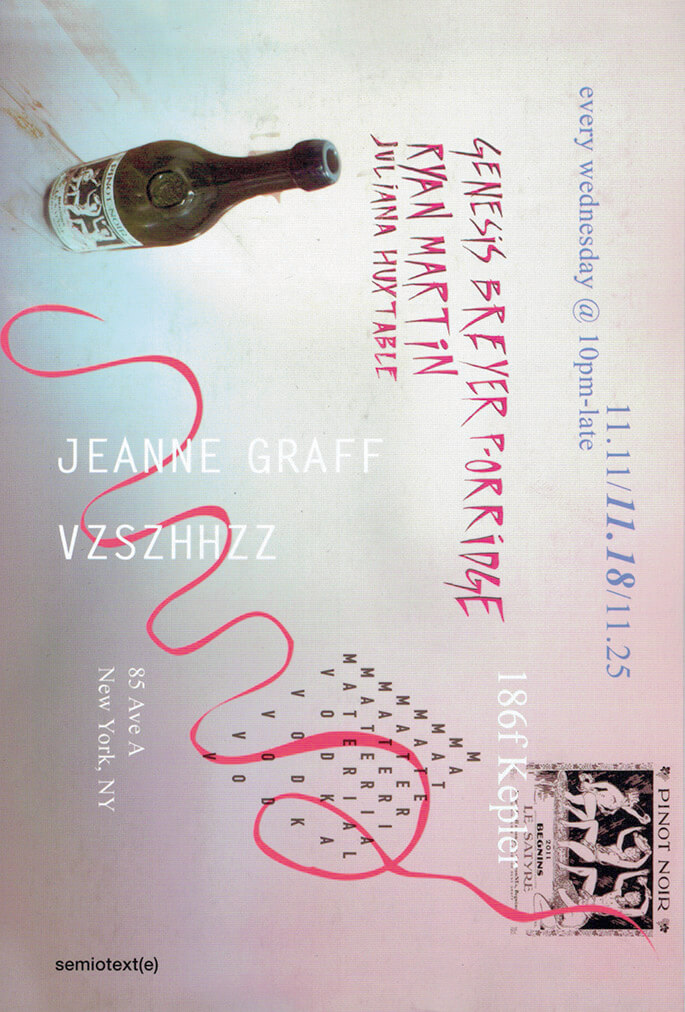
Vzszhhzz
Composed between destinations, in airplanes, trains, museums, and bars over three years, Jeanne Graff's Vzszhhzz captures the slight intersections of a loose group of artists and lawyers, restauranteurs, philosophers, wine-makers and boxers whose lives are conducted almost entirely in a second language. A loose chronicle masquerading as a novel, Vszhhzz - like Michèle Bernstein's All The King's Horses, the Bernadette Corporation's Reena Spaulings, and Natasha Stagg's Surveys - couches Graff's sharp observations in a laconic and ambient style. By not saying too much, Vzszhhzz says everything about the relation to time, cities, weather and smog that has become the lingua franca of a creative and transient life.
Writer and curator Jeanne Graff was born in Lausanne, Switzerland and lives in New York. She is a columnist for May Revue (Paris), works in a vineyard, and teaches at HEAD art school in Geneva. In 2014, Graff founded 186f Kepler, an art space without walls. She has organized numerous international exhibitions, and performs with her band Solar Lice. Graff recently completed a writing residency at Villa Noailles in Hyeres, France.

The Pain Journal
"The Pain Journal" is the last finished work by Los Angeles writer and artist Bob Flanagan and is the extraordinary chronicle of the final year of his life before his death from cystic fibrosis at the age of 43. Flanagan created performances with Sheree Rose that shocked and inspired audiences as he combined text, video, and live performance to create a highly personal exploration of childhood, sex, illness, and mortality.

Leash
Leash extends the logic of S&M to its inexorable and startling conclusion, darkly and hilariously revealing the masochistic impulse as the urge to disappear from the chores, obligations, and emotional vacuity of daily life.
No more jobs, no more taxes, no more checkbook, no more bills, no more credit cards, no more credit, no more money, no more mortgages, no more rent, no more savings, no more junk mail, no more junk, no more mail, no more phones, no more faxes, no more busy signals, no more computers, no more cars, no more drivers' licenses, no more traffic lights, no more airports, no more flying, no more tickets, no more packing, no more luggage, no more supermarkets, no more health clubs... While her current spends the summer researching public housing in Stockholm, a moderately wealthy, object-oppressed, and terminally hip New York female of a certain age seeks adventure in the sedate dyke bars of lower Manhattan. Finding none, she answers a personal ad. She is ordered to put on a blindfold before the first meeting with the woman she knows only as Sir. Not knowing what someone looks like turns out to be freeing, as do the escalating constraints that alienate her not just from her former life, but from her very conception of who she is. Part Georges Bataille, part Fran Leibowitz, this is the Story of O told with a self-referentially perverse sense of humor.

When The Sick Rule The World
A writer takes on subjects as varied as vomit, Kathy Acker's wardrobe, and Occupy Oakland, in lyric explorations of illness, health, and the body.
A moving meld of essay, memoir, and story, When the Sick Rule the World collects Dodie Bellamy's new and recent lyric prose. Taking on topics as eclectic as vomit, Kathy Acker's wardrobe, and Occupy Oakland, Bellamy here examines illness, health, and the body—both the social body and the individual body—in essays that glitter with wit even at their darkest moments.
In a safe house in Marin County, strangers allergic to the poisons of the world gather for an evening's solace. In Oakland, protesters dance an ecstatic bacchanal over the cancerous body of the city-state they love and hate. In the elegiac memoir, "Phone Home," Bellamy meditates on her dying mother's last days via the improbable cipher of Steven Spielberg's E.T. the Extra-Terrestrial. Finally, Bellamy offers a piercing critique of the displacement and blight that have accompanied Twitter's move into her warehouse-district neighborhood, and the pitiless imperialism of tech consciousness.
A participant in the New Narrative movement and a powerful influence on younger writers, Bellamy views heteronormativity and capitalism as plagues, and celebrates the micro-revolts of those on the outskirts. In its deft blending of forms, When the Sick Rule the World resiliently and defiantly proclaims the "undeath of the author." In the realm of sickness, Bellamy asserts, subjectivity is not stable. "When the sick rule the world, mortality will be sexy," Bellamy prophesies. Those defined by society as sick may, in fact, be its saviors.

Castle Faggot
In Derek McCormack's home province, farm boys with growing pains enjoy a little-known meal called bed-supper, a hearty bowl of sweet breakfast cereal enjoyed as a midnight snack. Here McCormack has composed a peculiarly salacious bed-supper, where the long secret sweet-tooth of the Marquis de Sade glints as it sinks into the dirtiest of dishes. This useful book will more than stay your appetite until breakfast — Castle Faggot is also a manual of redecoration, a musical, a puppet show, a theory of cosmetics, a work of poetics, and a glorious celebration of the French decadence. — Lisa Robertson, author of The Baudelaire Fractal
Derek McCormack is a writer who lives in Toronto. His previous books include The Show that Smells and The Well-Dressed Wound (Semiotext(e)).
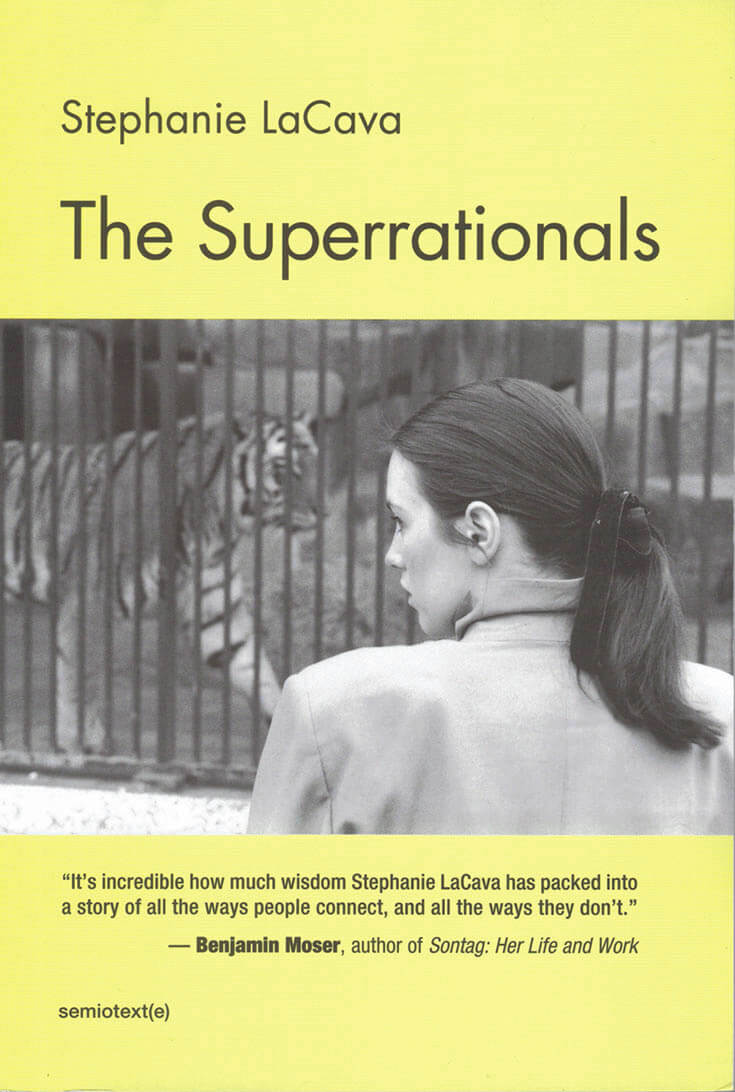
The Superrationals
An erotic and darkly comic novel about female friendship, set at the intersection between counterculture and the multimillion dollar art industry.
Over the course of a few days in the fall of 2015, the sophisticated and awkward, wry, and beautiful Mathilde upends her tidy world. She takes a short leave from her job at one of New York's leading auction houses and follows her best friend Gretchen on an impromptu trip to Paris. While there, she confronts her late mother's hidden life, attempts to rein in Gretchen's encounters with an aloof and withholding sometime-boyfriend, and faces the traumatic loss of both her parents when she was a teenager.
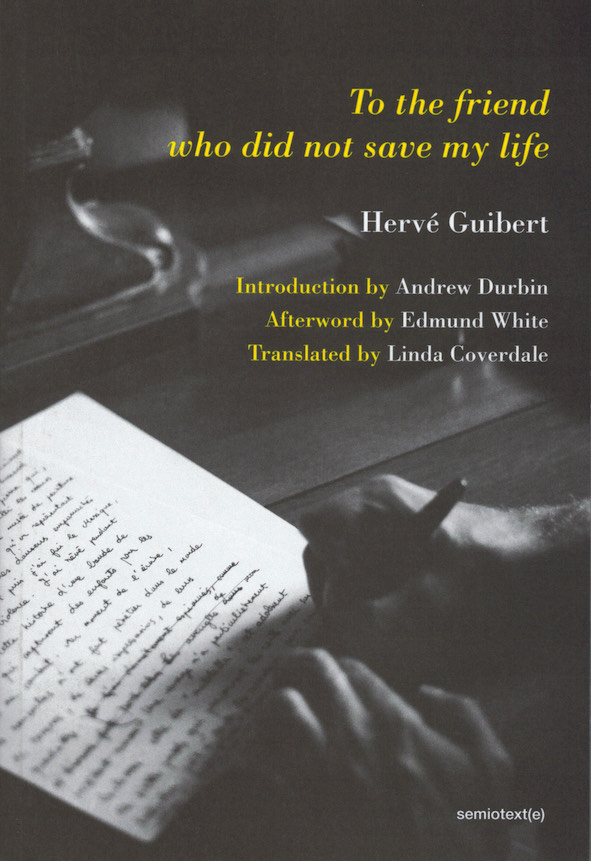
To the friend who did not save my life
A novel that describes, with devastating, darkly comic clarity, its narrator's experience of being diagnosed with AIDS. First published by Gallimard in 1990, To the Friend Who Did Not Save My Life describes, with devastating, darkly comic clarity, its narrator's experience of being diagnosed with AIDS. Guibert chronicles three months in the penultimate year of the narrator's life as, in the wake of his friend Muzil's death, he goes from one quack doctor to another, describing the progression of the disease and recording the reactions of his many friends.
The novel scandalized the French media, which quickly identified Muzil as Guibert's close friend Michel Foucault. To the Friend became a bestseller, and Guibert a celebrity. Guibert continued to document the daily experiences of his body in a series of novels and diaries, mostly published posthumously. To the Friend has since attained a cult following for its intimate and candid tone, its fragmented and slippery form. As Edmund White observed, "[Guibert's] very taste for the grotesque, this compulsion to offend, finally affords him the necessary rhetorical panache to convey the full, exhilarating horror of his predicament." In his struggle to piece together a language suited to his suffering, Hervé Guibert catapulted himself into notoriety and sealed his reputation for uncompromising, transgressive prose.
Translated from French by Linda Coverdale
Introduction by Andrew Durbin
Afterword by Edmund White
Published May 2020

Written in Invisible Ink
Written in Invisible Ink maps the writer's artistic development, from his earliest texts—fragmented stories of queer desire—to the unnervingly photorealistic descriptions in Vice and the autobiographical sojourns of Singular Adventures. Propaganda Death, his harsh, visceral debut, is included in its entirety. The volume concludes with a series of short, jewel-like stories composed at the end of his life. These anarchic and lyrical pieces are translated into English for the first time by Jeffrey Zuckerman.
From midnight encounters with strangers to tormented relationships with friends, from a blistering sequence written for Roland Barthes to a tender summoning of Michel Foucault upon his death, these texts lay bare Guibert's relentless obsessions in miniature.
Hervé Guibert published twenty-five books before dying of AIDS in 1991 at age 36. An originator of French autofiction of the 1990s, Guibert wrote with aggressive candor, detachment, and passion, mixing diary writing, memoir, and fiction. Best known for the series of books he wrote during the last years of his life, chronicling his coexistence with illness, he has been a powerful influence on many contemporary writers.
Edited and Translated by Jeffrey Zuckerman
Published May 2020
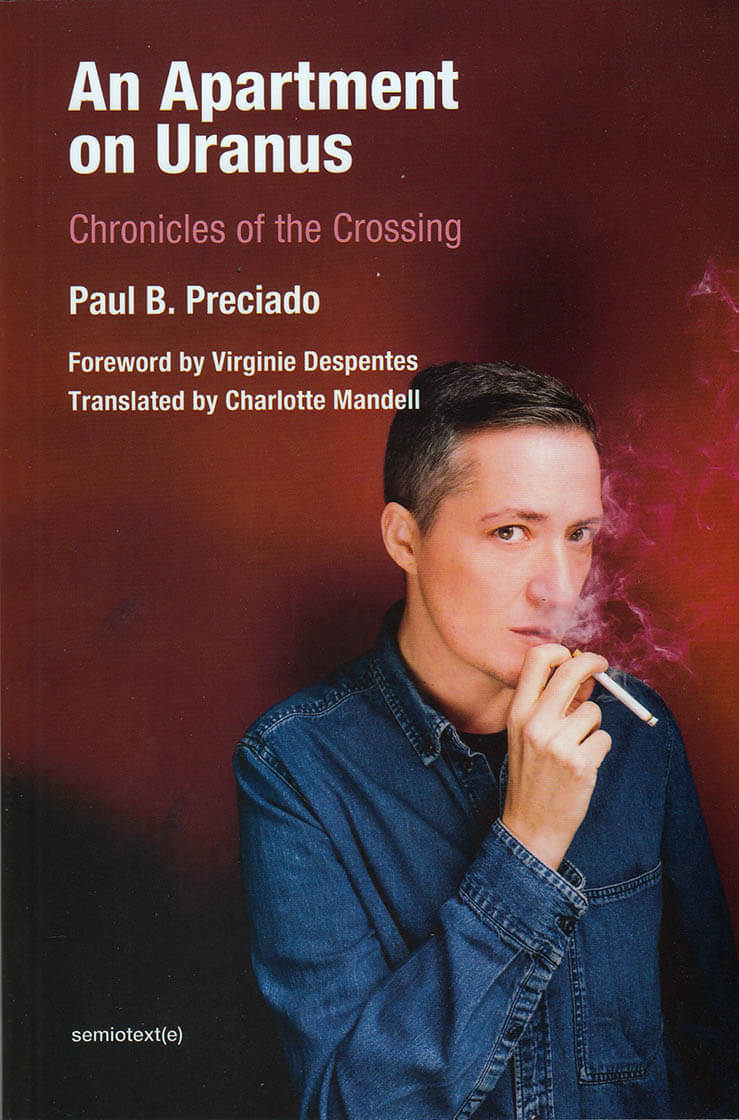
An Apartment on Uranus
A “dissident of the gender-sex binary system” reflects on gender transitioning and political and cultural transitions in technoscientific capitalism.
Uranus, the frozen giant, is the coldest planet in the solar system as well as a deity in Greek mythology. It is also the inspiration for uranism, a concept coined by the writer Karl Heinrich Ulrich in 1864 to define the “third sex” and the rights of those who “love differently.” Following Ulrich, Paul B. Preciado dreams of an apartment on Uranus where he might live beyond existing power, gender and racial strictures invented by modernity. “My trans condition is a new form of uranism,” he writes. “I am not a man. I am not a woman. I am not heterosexual. I am not homosexual. I am not bisexual. I am a dissident of the gender-sex binary system. I am the multiplicity of the cosmos trapped in a binary political and epistemological system, shouting in front of you. I am a uranist confined inside the limits of technoscientific capitalism.”
This book recounts Preciado's transformation from Beatriz into Paul B., but it is not only an account of gender transitioning. Preciado also considers political, cultural, and sexual transition, reflecting on issues that range from the rise of neo-fascism in Europe to the technological appropriation of the uterus, from the harassment of trans children to the role museums might play in the cultural revolution to come.

Dodie Bellamy Is on Our Mind
Anthony Huberman, Jeanne Gerrity
Examining the genre-bending writing of Dodie Bellamy, whose work has focused on sexuality, politics, feminism, narrative experimentation, and all things queer.
Dodie Bellamy Is on Our Mind is the first major publication to address Bellamy's prolific career as a genre-bending writer. Megan Milks made several trips to San Francisco in order to spend time with Bellamy and craft a provocative and fascinating profile of the writer. Originally delivered as a lecture at the Wattis Institute, Andrew Durbin's text takes the form of a personal essay, expertly weaving anecdotes of his own encounters with Bellamy's writing with insights into broader themes in her work. Academic Kaye Mitchell takes a close look at the role of shame and its relationship to femininity in particular texts by Bellamy. And Bellamy and her late husband Kevin Killian offer deeply personal, emotionally wrenching ruminations on topics from the mundane (drawing) to the profound (mortality). These texts, alongside archival photos and a complete bibliography make, this book an important compendium on Bellamy.
Dodie Bellamy (b. 1951, in North Hammond, Indiana) has lived and worked in San Francisco since 1978. A vital contributor to the Bay Area's avant-garde literary scene, Bellamy is a novelist and poet whose work has focused on sexuality, politics, feminism, narrative experimentation, and all things queer. In her words, she champions “the vulnerable, the fractured, the disenfranchised, the fucked-up.”
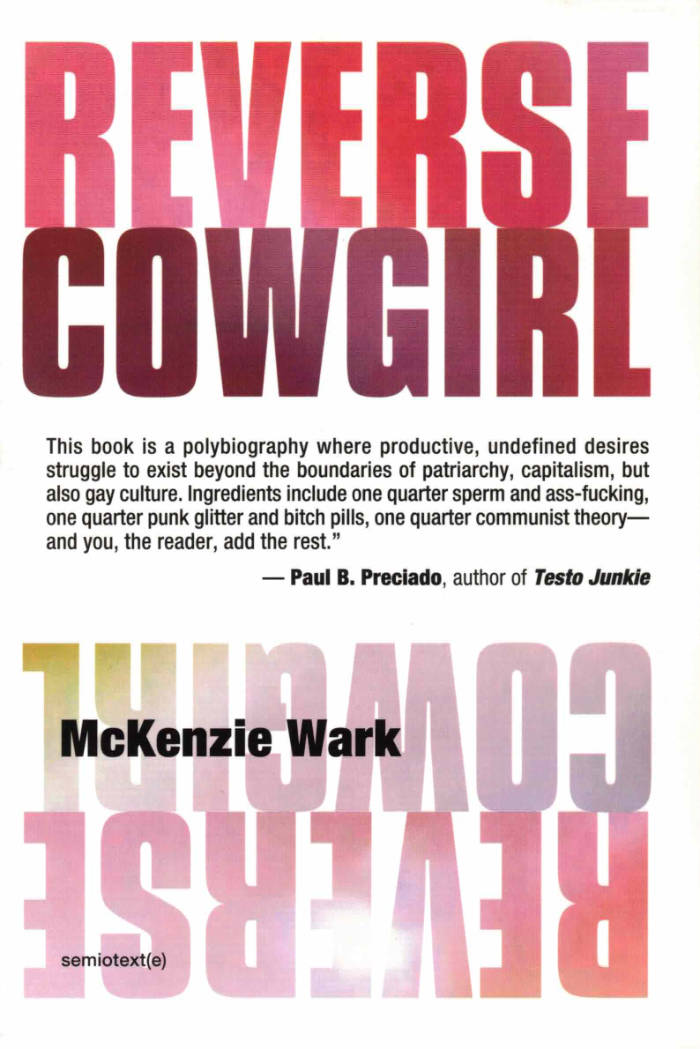
Reverse Cowgirl
McKenzie Wark invents a new genre for another gender: not a memoir but an auto-ethnography of the opacity of the self.
Another genre for another gender.
What if you were trans and didn't know it? What if there were some hole in your life and you didn't even know it was there? What if you went through life not knowing why you only felt at home in your body at peak moments of drugs and sex? What if you expended your days avoiding an absence, a hole in being? Reverse Cowgirl is not exactly a memoir. The author doesn't, in the end, have any answers as to who she really is or was, although maybe she figures out what she could become.
Traveling from Sydney in the 1980s to New York today, Reverse Cowgirl is a comedy of errors, chronicling the author's failed attempts at being gay and at being straight across the shifting political and media landscapes of the late twentieth century. Finding that the established narratives of being transgender don't seem to apply to her, Wark borrows from the genres of autofiction, fictocriticism, and new narrative to create a writing practice that can discover the form of a life outside existing accounts of trans experience: an auto-ethnography of the opacity of the self.
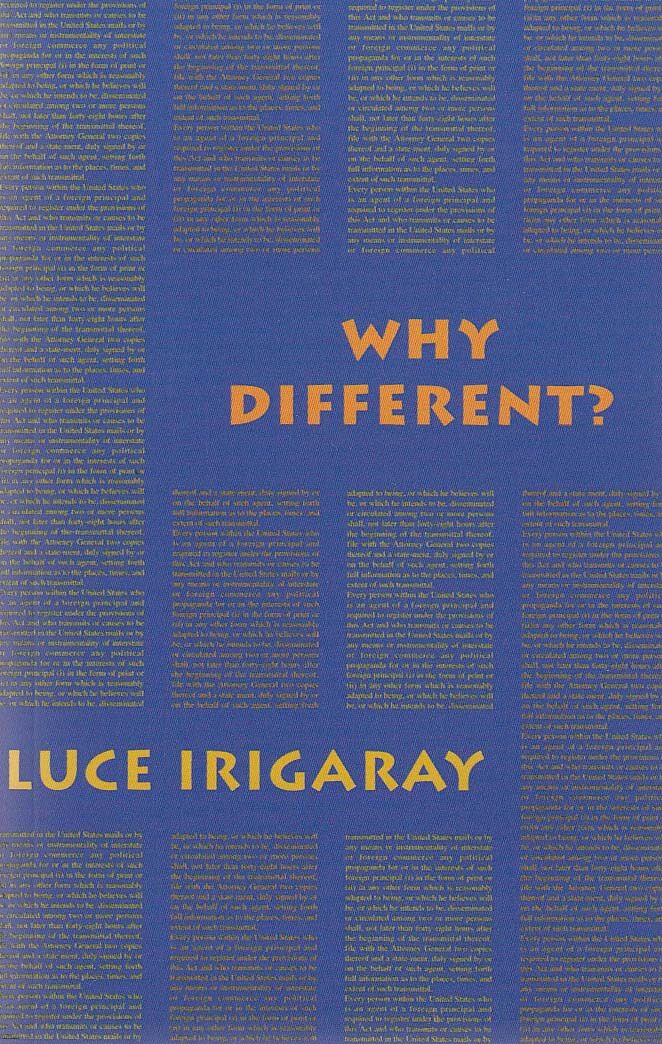
Why Different
A collection of interviews that deal explicitly with the relationship between daughter and mother, the sexuation of language, the symbolic order, and the importance of both history and philosophy for the liberation of the feminine subject.
For Luce Irigaray, one of the most original French feminist theorists, deconstructing the patriarchal tradition is not enough. She admits that it is not an easy task, but she believes that it is necessary to also define new values directly or indirectly suitable to feminine subjectivity and to feminine identity. She begins this project by analyzing and interpreting the absence of the feminine subject in the definition of dominant cultural values. She then wonders how these new values can be constructed without simply reversing the roles. Far from implying a hierarchy, difference affirms the coexistence and fruitful encounter of two different identities. These two heterogeneous identities, masculine and feminine, are not socially but ontologically constructed and describing the feminine requires establishing methods other than those already used by the masculine subject. Why Different? is a collection of interviews, conducted in both France and Italy, that deal explicitly with the relationship between daughter and mother, the sexuation of language, the symbolic order, and the importance of both history and philosophy for the liberation of the feminine subject. In Why Different? Irigaray elaborates on issues brought up in her other books, Speaking is Never Neutral, I Love to You, Thinking the Difference, and To Be Two and brings them to fruition.
Edited by Sylvère Lotringer.
Translated by Camille Collins.

The New Fuck You
Borrowing its name from the notorious '60s Ed Sanders magazine, Fuck You: A Magazine of the Arts, the editors have figured a way to rehone its countercultural and frictional stance with style and aplomb. A unique and provocative anthology of lesbian writing, guaranteed to soothe the soulful and savage the soulless. Includes Adele Bertei, Holly Hughes, Sapphire, Laurie Weeks, and many more.
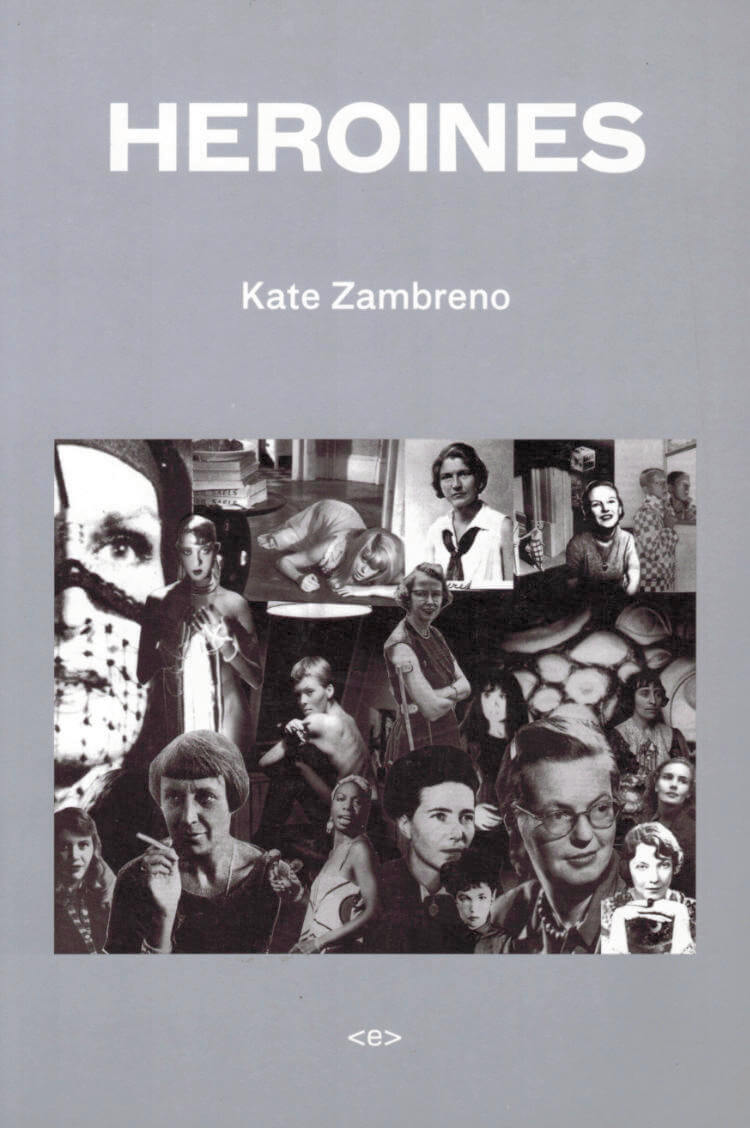
Heroines
A manifesto for "toxic girls" that reclaims the wives and mistresses of modernism for literature and feminism. On the last day of December, 2009 Kate Zambreno began a blog called Frances Farmer Is My Sister, arising from her obsession with the female modernists and her recent transplantation to Akron, Ohio, where her husband held a university job. Widely reposted, Zambreno's blog became an outlet for her highly informed and passionate rants about the fates of the modernist "wives and mistresses." In her blog entries, Zambreno reclaimed the traditionally pathologized biographies of Vivienne Eliot, Jane Bowles, Jean Rhys, and Zelda Fitzgerald: writers and artists themselves who served as male writers' muses only to end their lives silenced, erased, and institutionalized. Over the course of two years, Frances Farmer Is My Sister helped create a community where today's "toxic girls" could devise a new feminist discourse, writing in the margins and developing an alternative canon.
In Heroines, Zambreno extends the polemic begun on her blog into a dazzling, original work of literary scholarship. Combing theories that have dictated what literature should be and who is allowed to write it—from T. S. Eliot's New Criticism to the writings of such mid-century intellectuals as Elizabeth Hardwick and Mary McCarthy to the occasional "girl-on-girl crime" of the Second Wave of feminism—she traces the genesis of a cultural template that consistently exiles female experience to the realm of the "minor," and diagnoses women for transgressing social bounds. "ANXIETY: When she experiences it, it's pathological," writes Zambreno. "When he does, it's existential." By advancing the Girl-As-Philosopher, Zambreno reinvents feminism for her generation while providing a model for a newly subjectivized criticism.
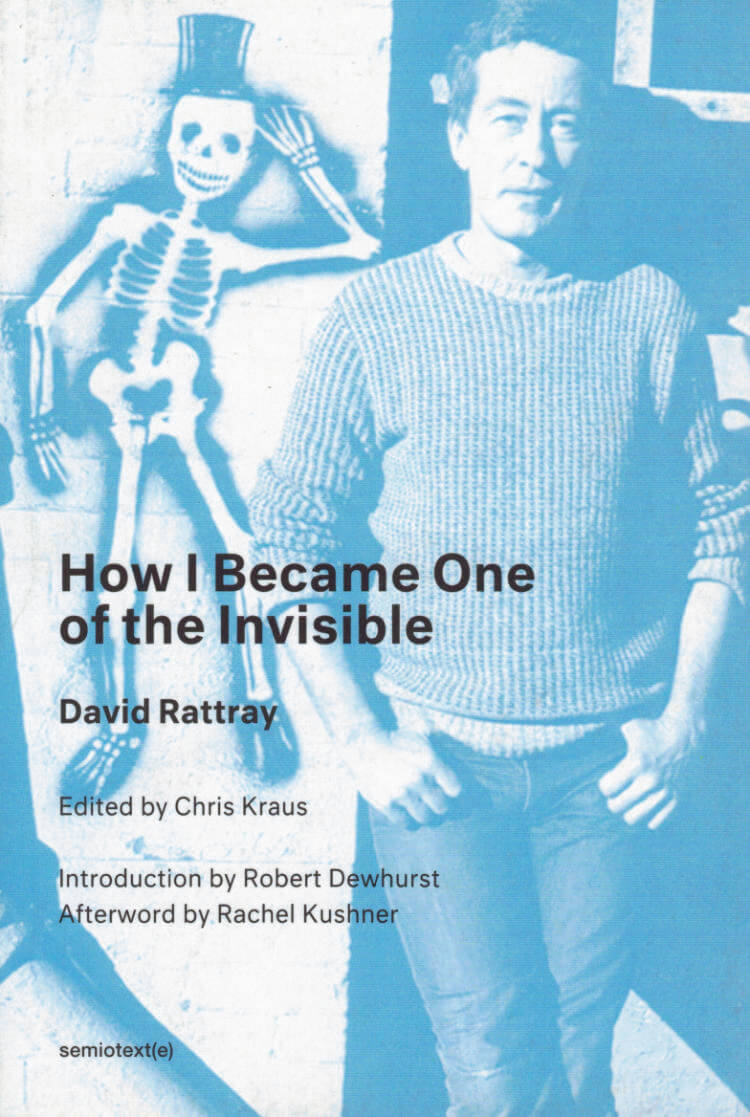
How I Became One of the Invisible
The only collection of Rattray's prose: essays that offer a kind of secret history and guidebook to a poetic and mystical tradition. Since its first publication in 1992, David Rattray's How I Became One of the Invisible has functioned as a kind of secret history and guidebook to a poetic and mystical tradition running through Western civilization from Pythagoras to In Nomine music to Hölderlin and Antonin Artaud. Rattray not only excavated this tradition, he embodied and lived it. He studied at Harvard and the Sorbonne but remained a poet, outside the academy. His stories "Van" and "The Angel" chronicle his travels in southern Mexico with his friend, the poet Van Buskirk, and his adventures after graduating from Dartmouth in the mid-1950s.
Eclipsed by the more mediagenic Beat writers during his lifetime, Rattray has become a powerful influence on contemporary artists and writers. Living in Paris, Rattray became the first English translator of Antonin Artaud, and he understood Artaud's incisive scholarship and technological prophecies as few others would.
As he writes of his translations in How I Became One of the Invisible, "You have to identify with the man or the woman. If you don't, then you shouldn't be translating it. Why would you translate something that you didn't think had an important message for other people? I translated Artaud because I wanted to turn my friends on and pass a message that had relevance to our lives. Not to get a grant, or be hired by an English department."
Compiled in the months before his untimely death at age 57, How I Became One of the Invisible is the only volume of Rattray's prose. This new edition, edited by Robert Dewhurst, includes five additional pieces, two of them previously unpublished.